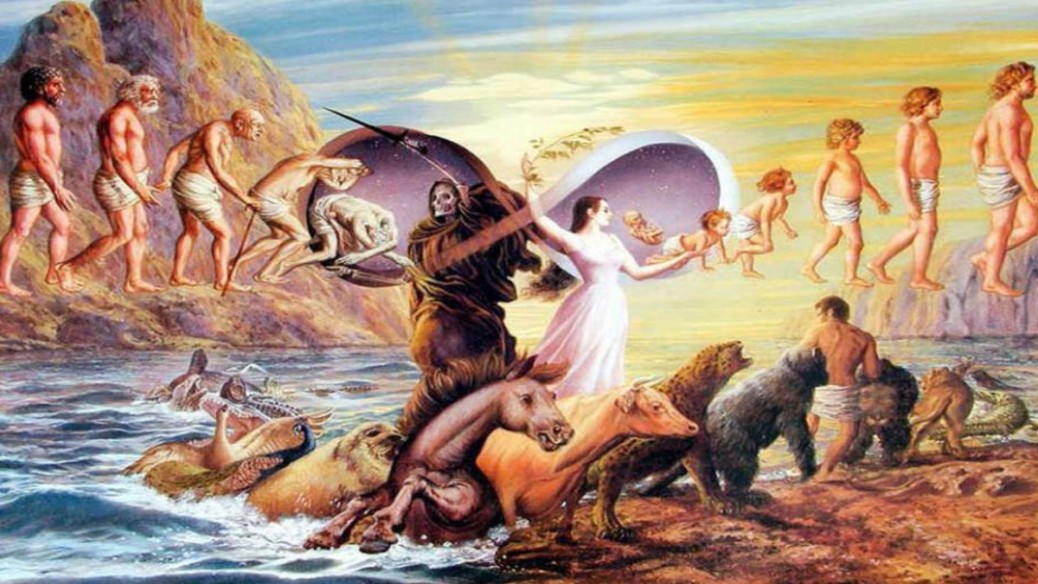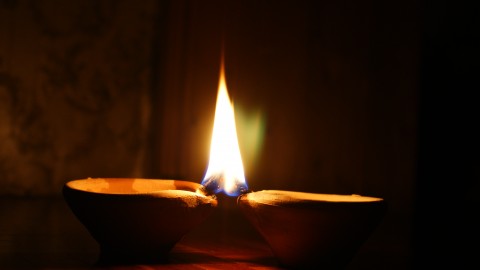BY PERFORMING SAMYAMA ON THE TWO TYPES OF KARMA, ACTIVE AND DORMANT, OR UPON OMENS AND PORTENTS, THE EXACT TIME OF DEATH CAN BE PREDICTED.
Many things. First, why be worried about the exact time of death? How is it going to help? What is the point of it? If you ask Western psychologists, they will almost call it abnormal morbidity. Why be concerned with death? Avoid. Go on believing that death is not going to happen – at least not to you. It always happens to somebody else. You have seen people die, you have never seen yourself die, so why be afraid? You may be the exception. But nobody is an exception; and death has already happened in your birth, so you cannot avoid it.
Now the birth is beyond your power. You cannot do anything about it; it has already happened. It is already past; it is already done. You cannot undo it. Death is yet to happen: something is possible to be done about it.
The whole of Eastern religion depends on the vision of death, because that is the possibility which is going to happen. If you know it beforehand, there are tremendous possibilities. Many doors open. Then you can die in your own way, then you can die with a signature of your own on your death. Then you can manage not to be born again – that is the whole meaning. It is not morbid. It is very, very scientific. When everybody is going to die, this is absolutely foolish not to think about death, not to meditate upon death, not to focus upon it, not to come to a deep understanding about it.
It is going to happen. If you know, much is possible.
Patanjali says even the exact date, the hour, the minute, the second of death can be known beforehand. If you know exactly when death is coming, you can prepare. Death has to be received like a great guest. It is not the enemy. In fact it is a god given gift. It is a great opportunity to pass through. It can become a breakthrough: if you can die alert, conscious, aware, you will never be born again – and there will be no death anymore. If you miss, you will be born again. If you go on missing, you will be continuously born again and again, unless you learn the lesson of death.
Let me say it in this way: the whole of life is nothing but a learning about death, a preparation for death. That’s why death comes in the end. It is the pinnacle, the crescendo, the very climax, the peak.
In the West particularly, contemporary psychologists have become aware that in a deep sex act a certain peak can be attained, a climax, a great orgasm, which is tremendously fulfilling, exhilarating, ecstatic. You are cleansed; you come out of it rejuvenated, fresh, again young, again alive – all the dust gone, as if you have taken a great shower, an energy shower. But they have not yet come to know that the sex act is a very minor death; and one who can achieve deep orgasm is one who allows himself to die in love. It is a minor death, nothing to be compared with death. Death is the greatest orgasm there is.
The intensity of death is such that almost always people become unconscious. They cannot face it.
The moment death comes, you are so afraid, so full of anxiety, to avoid it you become unconscious.
Almost ninety-nine percent of people die unconsciously. They miss the opportunity.
To know death beforehand is just a method to help you prepare so when death comes you are perfectly alert and aware, waiting, ready to go with death, ready to surrender, ready to embrace death. Once you have accepted death in awareness, there is no longer any birth for you – you have learned the lesson. Now there is no coming back to the school again. This life is just a school, a discipline – a discipline to learn death. It is not morbid.
The whole of religion is concerned with death, and if some religion is not concerned with death, then it is not religion at all. It may be sociology, ethics, morality, or politics, but it cannot be religion.
Religion is the search of the deathless; but that deathless is possible only through the door of death.
This sutra says, “By performing samyama on the two types of karma, active and dormant, or upon omens and portents, the exact time of death can be predicted.” The Eastern analysis of karma says that there are three types of karma. Let us understand them.
First is called sanchita. Sanchita means the total, the total of all your past lives. Whatsoever you have done, howsoever you have reacted to situations, whatsoever you have thought and desired, achieved, missed – the total – the total of your doings, thinkings, feelings of all the lives is called sanchita. Sanchita: the word means the all, the accumulated all.
The second type of karma is known as prarabdha. The second type of karma is that part of sanchita which you have to fulfill in this life, which has to be worked out in this life. You have lived many lives; you have accumulated much. Now a part of it will have the opportunity to be acted out, realized, suffered, passed through in this life. Only a part of it, because this life has a limitation – seventy, eighty, or a hundred years. In a hundred years you cannot live all the past karmas – the sanchita, the accumulated – only a part of it. That part is called prarabdha.
Then there is a third type of karma which is known as kriyaman. That is a day today karma. First the accumulated whole, then a small portion of it for this life, then even a smaller portion of it for today or for this moment. Each moment there is an opportunity to do something or not to do something.
Somebody insults you: you become angry. You react, you do something; or, if you are aware, you simply watch, you don’t become angry. You simply remain a witness. You don’t do anything; you don’t react. You remain cool and collected; you remain centered. The other has not been able to disturb you.
If you are disturbed by the other and you react, then the kriyaman karma falls into the deep reservoir of the sanchita. Then you are accumulating again; then for future lives you are accumulating. If you don’t react, then a past karma is fulfilled – you must have insulted this man in some past life, now he has insulted you; the account is closed. Finished. A man who is aware will feel happy that at least this part is finished. He has become a little more free.
Somebody came and insulted Buddha. Buddha remained quiet, he listened attentively, and then he said, “Thank you.” The man was very much puzzled; he said, “Have you gone mad? I am insulting you, hurting you, and you simply say thank you?” Buddha said, “Yes, because I was waiting for you. I had insulted you in the past, and I was waiting – unless you come I will not be totally free. Now you are the last man; my accounts are closed. Thank you for coming. You might have waited, you might not have come in this life, then I would have had to wait for you. And I don’t say anything anymore, because enough is enough. I don’t want to create another chain.”
Then the kriyaman karma, the day-to-day karma, does not fall into the reservoir, does not add to it; in fact, the reservoir is a little less than it was. The same is true about prarabdha – the whole life, this life. If in this life you go on reacting, you are creating the reservoir more and more. You will have to come again and again. You are creating too many chains; you will be in bondage.
Try to understand the Eastern concept of freedom. In the West freedom has a connotation of political freedom. In India we don’t bother much about political freedom, because we say unless one is spiritually free, it makes not much difference whether you are politically free or not. The fundamental thing is to be spiritually free.
The bondage is created by the karmas. Whatsoever you do in unawareness becomes karma.
Any action done in unawareness becomes a karma because any action done in unawareness is not action at all; it is a reaction. When you do something in full awareness it is not a reaction; it is an action, spontaneous, total. It leaves no trace. It is complete in itself; it is not incomplete. If it is incomplete then some day or other it will have to be completed. So if in this life you remain alert, then the prarabdha disappears and your reservoir becomes more and more empty. In a few lives the reservoir becomes absolutely empty.
This sutra says, “By performing samyama on the two types of karma….” Patanjali means sanchita and prarabdha because the kriyaman is nothing but a part of prarabdha, so he divides in two.
What is samyama? That has to be understood. Samyama is the greatest synthesis of human consciousness, the synthesis of three: dharana, dhyan, samadhi.
Ordinarily, your mind is continuously jumping from one object to another. Not for a single moment are you in tune with one object. You go on jumping. Your mind goes on constantly moving; it is like a flux. This moment something is in the focus of the mind, next moment something else, next moment still something else. This is the ordinary state of mind.
The first step out of it is dharana. Dharana means concentration – fixing your whole consciousness on one object, not allowing the object to disappear, bringing again and again your consciousness on the object so that the unconscious habit of the mind of continuous flux can be dropped; because once the habit of continuous change can be dropped, you attain to an integrity, to a crystallization.
When there are so many objects moving continuously, you remain so many. Understand it. You remain divided because your objects are divided.
For example, you love one woman today, another woman tomorrow, another woman the third day.
That will create a division in you. You cannot be one; you will become many. You will become a crowd. Hence the Eastern insistence to create a love in which you can remain for a longer period, as long as possible. There have been experiments in the East in which a couple has remained a couple for many lives together. Again and again the same woman, the same man: that gives an integrity. Too much change erodes your being, splits you. So if in the West schizophrenia is becoming almost a normal thing, it is not something to be wondered at. It is not strange; it is natural.
Everything is changing.
I have heard that one film actress in Hollywood got married to her eleventh husband. She came home, introduced the new dad to the children. The children brought a register, and they said to the dad, “Please sign it, because today you are here, tomorrow you may be gone; and we are accumulating the signatures, autographs, of all our dads.”
You go on changing houses; you go on changing everything. In America the average limit of a person’s job is three years. The job is also continuously changing. The house – the average limit of a person staying in one town is also three years. And the average limit of marriage is also three years. Somehow three years seems to be very important. It seems if you remain in the fourth year with the same woman there is fear that you may get settled. If you remain in the same job for more than three years there is fear that you may get settled. So people go on; they have become almost vagabonds. That creates divisions inside you.
In the East we tried to give a job to a person as part of his life. A man was born in a Brahmin house: he remained a Brahmin. That was a great experiment to give stability. A man was born in a shoemaker’s house: he remained a shoemaker. The marriage, the family, the job, the town – people were born in the same town and they would die in the same town. Lao Tzu remembers, “I have heard that in the ancient days people had not gone beyond the river.” They had heard dogs barking on the other side, the other shore. They had inferred that there must be a town because in the evening they had seen smoke rising – people must be cooking. They had heard dogs barking, but they had not bothered to go and see. People were so harmoniously settled.
This constant change simply says that your mind is feverish. You cannot stay longer at anything; then your whole life becomes a life of continuous change – as if a tree is being uprooted again and again and again and never gets the right time to send its roots deep down into the earth. The tree will be alive only for the name’s sake. It will not be able to bloom, not possible, because before flowers come, the roots have to settle.
So, concentration means bringing your consciousness to one object and becoming capable of retaining it there – any object. If you are looking at a rose flower, you continuously look at it. Again and again the mind wanders, goes here and there; you bring it back. You tame the mind – you tame the bull. You bring it back to the rose. The mind goes again; you bring it back. By and by, the mind starts being with the rose for longer periods. Once your mind remains with the rose for a long period, you will be able for the first time to know what a rose is. It is not just a rose: God has flowered in it.
The fragrance is not only of the rose; the fragrance is divine. But you never were en rapport with it for long.
Sit with a tree and be with it. Sit with your boyfriend or girlfriend and be with him or her, and bring yourself again and again. Otherwise, what is happening? Even if you are making love to a woman, you are thinking of something else – maybe moving in a totally different world. Even in love you are not focused. You miss much. A door opens, but you are not there to see it. You come back when the door is closed again.
Each moment there are millions of opportunities to see God, but you are not there. He comes and knocks at your doors, but you are not there. You are never found there. You go on roaming around the world. This roaming has to be stopped; that’s what is the meaning of dharana. Dharana is the first step of the great synthesis of samyama.
The second step is dhyan. In dharana, in concentration, you bring your mind to a focus: the object is important. You have to bring again and again the object in your consciousness; you are not to lose track of it. The object is important in dharana. The second step is dhyan, meditation. In meditation the object is not important anymore; it becomes secondary. Now, the flow of consciousness becomes important – the very consciousness which is being poured on the object. Any object will do, but your consciousness should be poured in a continuity; there should not be gaps.
Tags: Patanjali Yoga Sutra 36 Unawareness Becomes Karma










